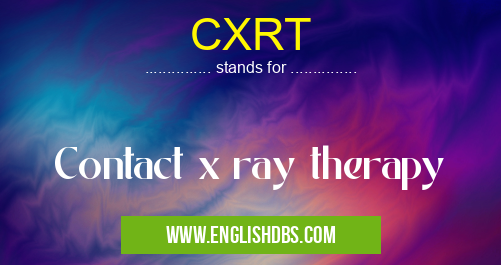What does CXRT mean in CONTACT
Contact X-ray therapy (CXRT) is a non-invasive medical procedure that involves delivering a controlled dose of radiation to a specific area of the body. It is commonly used to treat conditions such as cancer and certain non-malignant conditions.

CXRT meaning in Contact in Contact
CXRT mostly used in an acronym Contact in Category Contact that means Contact x ray therapy
Shorthand: CXRT,
Full Form: Contact x ray therapy
For more information of "Contact x ray therapy", see the section below.
CXRT Meaning in CONTACT
- CXRT stands for Contact X-ray Therapy.
Full Form of CXRT
- The full form of CXRT is Contact X-ray Therapy.
What does CXRT Stand for?
- CXRT stands for Contact X-ray Therapy.
How CXRT Works
- During CXRT, a specially designed X-ray machine delivers a targeted beam of radiation to the affected area. The radiation energy destroys cancerous cells or reduces their growth while minimizing damage to surrounding healthy tissue.
Features of CXRT
- Non-invasive procedure
- Precise targeting of affected area
- Minimal discomfort
- Short treatment sessions
- Can be repeated as needed
Applications of CXRT
- Cancer Treatment: CXRT is commonly used to treat various types of cancer, including skin cancer, breast cancer, and head and neck cancer.
- Non-Malignant Conditions: CXRT can also be used to treat certain non-malignant conditions, such as keloids, benign tumors, and warts.
Benefits of CXRT
- Effective treatment for localized conditions
- Minimizes damage to healthy tissue
- Can be combined with other treatment modalities
- Cost-effective compared to some surgical procedures
Essential Questions and Answers on Contact x ray therapy in "CONTACT»CONTACT"
What is CXRT (Contact X-ray Therapy)?
CXRT is a non-invasive radiation therapy that delivers low-energy X-rays to the skin's surface. It is used to treat superficial skin lesions, such as basal cell carcinoma and squamous cell carcinoma.
How does CXRT work?
CXRT works by delivering targeted radiation to the affected skin area, destroying cancer cells while minimizing damage to surrounding healthy tissue.
What are the benefits of CXRT?
CXRT offers several benefits, including:
- Non-invasive and painless
- Effective in treating superficial skin cancers
- Minimal scarring and discoloration
- Can be used on areas that are difficult to treat with surgery
What are the side effects of CXRT?
Common side effects of CXRT include:
- Skin irritation (redness, dry skin, peeling)
- Temporary hair loss in the treated area
- Itching or discomfort
- In rare cases, scarring or discoloration
Who is a good candidate for CXRT?
CXRT is most suitable for individuals with superficial skin cancers that are small in size and located in areas that are difficult to treat surgically. It is also an option for patients who are not suitable for other treatment methods, such as surgery or chemotherapy.
How is CXRT performed?
During CXRT, the patient is positioned comfortably, and the treatment area is cleaned and marked. The X-ray machine is then positioned to deliver a precise dose of radiation to the affected skin. Treatment sessions typically last for a few minutes and are repeated daily or weekly for several weeks.
What is the success rate of CXRT?
The success rate of CXRT depends on factors such as the type and stage of cancer, the size of the lesion, and the patient's overall health. In general, CXRT has a high success rate for treating superficial skin cancers, with cure rates often exceeding 90%.
Final Words: CXRT is a valuable medical procedure that offers a safe and effective treatment option for a wide range of conditions. Its non-invasive nature, precise targeting, and minimal discomfort make it a preferred choice for many patients.
